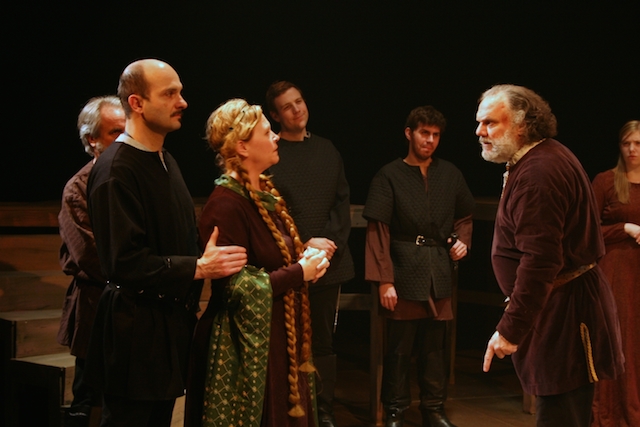Julia Knitel in Beautiful: The Carole King Musical. Photo by Joan Marcus.
Beautiful: The Carole King Musical
Music & lyrics by Gerry Goffin, Carole King, Barry Mann and Cynthia Weil
Book by Douglas McGrath
Directed by Marc Bruni
Review by Keith Waits
Entire contents copyright © 2017 by Keith Waits. All rights reserved
If nothing else, Beautiful: The Carole King Musical serves as an important history lesson since, judging by the chatter at intermission, the great majority of the audience was unaware of her story: teenage songwriter in the 1950’s, early marriage with songwriting partner Gerry Goffin, author of “Take Good Care of My Baby,” “Up On The Roof,” The Locomotion,” “Chains,” and many other classic hits; for many, the milestone 1971 album is the beginning, and perhaps everything they know of King.
The dissolution of her marriage to Goffin was a source of great pain and unhappiness for King; she famously avoided seeing this musical for a long time because she didn’t relish reliving that part of her life. Yet the balance of juke-box musical and biography never really allows their story to develop sufficient emotional impact, and the book at times feels like a series of dramatic peaks used as cues for the next musical number, so that the narrative struggles to rise above the superficial.
Yet the script is very funny, with sharp comic dialogue delivered by a cast with expert timing, and the score is irresistible; music that charts a key time of transition in American popular culture. King’s biography captures the loss of innocence coming into the 1960’s and how the trend in female singer-songwriters reflected the development of the women’s movement and modern feminism. The book recognizes all of this, but doesn’t dig very deep. King’s shift into independence is glossed over and made to look much too easy. One leaves the theatre feeling that King’s solo career was almost preordained, when the reality was that it was harder won. Tapestry was not her first album, and she struggled more to gain confidence than what we witness onstage.
King’s life contains more heartbreak and conflict after this success, but the musical is smart to remain focused on the earlier period, and it pours it on with the musical numbers with energetic, well-choreographed (by Josh Prince) performances that avoid slavishly recreating the originals in favor of new arrangements that evoke the period with a contemporary spin. Some of the better numbers are from the groups that recorded the hits: The Drifters, The Shirelles, and Little Eva. The inestimable ensemble rotates through different roles, including a few instantaneous and ingenuously engineered costume changes that are astonishing. The set design by Derek McLane is equally fluid, with a set of cubes that are cleverly adaptive for individual scenes and arrangements that represent both physical and cultural groupings.
Julia Knitel is marvelous as Carole King, effortlessly essaying the youthful, intelligent, but inexperienced teenager as well as the over-burdened adult, and then perfectly embodying the “natural” woman in her triumphant 1972 Carnegie Hall concert. It was gratifying that the one time the audience applauded that was not after a song was in the moment of King’s empowerment as an individual. When Knitel took her final bow during the extended, sing-along curtain call, it wasn’t clear to me if the house was cheering Knitel or King, so successful is her performance. But don’t mistake this for one of these tribute shows in which we marvel at the verisimilitude of mimicry, Knitel’s fully realized characterization is the key to the show’s success as a narrative, overcoming the script’s shortcomings and connecting fully with the audience.
Liam Tobin’s Gerry Goffin fulfills the show’s requirements, but he seems miscast for what we know of Goffin. Tobin is handsome and charismatic, but he seems stuck in the melodramatic characterization at play here. Erika Olsen and Ben Fankhauser are a delight as friends and competing songwriting team Cynthia Weil and Barry Mann, and Mr. Fankhauser almost steals every scene he is in with his perfect comic delivery. Their love story is a sweet contrast to the more troubled King-Goffin dynamic.
James Clow is also good as Don Kirshner, although he seems far more forceful and authoritative than memories of the real thing woodenly hosting Don Kirshner’s Rock Concert in the late 1970’s. Still, Kirshner was unquestionably a legend in the recording industry, and Clow, and Beautiful give him his due.
My criticisms notwithstanding, Beautiful: The Carole King Musical is hugely entertaining, a show that will almost certainly send audience members home to pull out their copy of Tapestry – my own advice would be to find the Carnegie Hall concert, available through online streaming services, which frames the story.
Beautiful: The Carole King Musical
May 15 – 21, 2017
PNC Broadway In Louisville
Kentucky Center for the Performing Arts
501 West Main Street
Louisville, KY 40204
502-584-7777
http://louisville.broadway.com
Keith Waits is a native of Louisville who works at Louisville Visual Art during the days, including being the host of PUBLIC on WXOX-FM 97.1/ ARTxFM.com, but spends most of his evenings indulging his taste for theatre, music and visual arts. His work has appeared in Pure Uncut Candy, TheatreLouisville, and Louisville Mojo. He is now Managing Editor for Arts-Louisville.com.






